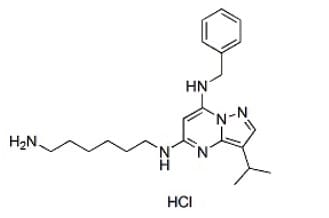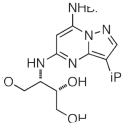CDK7 inhibitor BS-181 Small Molecule (Tool Compound)
Invented at Imperial College
- Datasheet
- References (6)
- Inventor Info
Info
| Catalogue Number | 151712 |
| Antigen/Gene or Protein Targets | CDK7 |
| Type | Inhibitor |
| Relevance |
BS-181 is a highly selective CDK inhibitor for CDK7 (and with lower selectivity to other kinases) with antitumoral activity in vitro and no apparent toxicity. Cyclin-dependent protein kinases (CDKs) have a central function in the regulation of cell proliferation, apoptosis and gene expression. CDK7 regulates the activation of CDK1, CDK2, CDK4, CDK5 and CDK6 and is involved in the regulation of transcription as part of the transcription factor TFIIHcomplex. A common feature of cancer is the over-expression of CDK7, making it an attractive target for anti-cancer drug development. The pyrazolo[1,5-a] pyrimidine compound BS-181 is a highly selective CDK7 inhibitor (IC50: 21 nM) with 42-fold selectivity over CDK2 (IC50: 880 nM), which is the only other CDK that is inhibited in concentrations lower than 1 μM. In MCF-7 cells, BS-181 inhibited the phosphorylation of CDK7 substrates, promoted cell cycle arrest and apoptosis to inhibit the growth of cancer cell lines, and showed antitumor effects in vivo. The compound was stable in vivo with a plasma elimination half-life in mice of 405 minutes after i.p. administration of 10 mg/kg. The same dose of compound inhibited the growth of MCF-7 human xenografts in nude mice. |
| On Target IC50 | 21 nM |
| Selectivity | More than 40-fold selective for CDK7 than CDK1, 2, 4, 5, 6, or 9. |
| Molecular Formula | C22H32N6.HCl |
| lUPAC | N5-(6-Aminohexyl)-3-(1-methylethyl)-N7-(phenylmethyl)-pyrazolo[1,5-a]pyrimidine-5,7-diamine hydrochloride |
| Molecular Weight (g/mol) | 416.99 |
| In vivo applications | BS-181 is stable in vivo with a plasma elimination half-life in mice of 405 minutes after i.p. administration of 10 mg/kg. BS-181 inhibits the growth of MCF-7 xenografts in the nude mice model in a dose-dependent manner, with 25% and 50% reduction in tumor growth after 2 weeks of treatment at 10 mg/kg/day and 20 mg/kg/day, respectively without apparent toxicity. |
| In vitro applications | BS-181 is a small molecule inhibitor of CDK7 in a cell-free environment, which displays more potential activity than roscovitine with IC 50 of 510 nM. Among the CDKs and other 69 kinases from many different classes, BS-181 shows high inhibitory selectivity for CDK7, inhibits CDK2 at concentrations lower than 1 μM which being inhibited 35-fold less potently (IC50 with 880 nM) than CDK7, shows slight inhibition for CDK1, CDK4, CDK5, CDK6 and CDK9 with IC50 values higher than 3.0 μM, and only shows inhibition for several kinases from other classes at high concentrations (>10 μM). BS-181 promotes cell cycle arrest and inhibits the cancer cell growth of a range of tumor types, including breast, lung, prostate and colorectal cancer with IC50 in the range of 11.5-37 μM. In MCF-7 cells, BS-181 inhibits the phosphorylation of the CDK7 substrate RNA polymerase II COOH-terminal domain (CTD), and promotes cell cycle arrest and apoptosis to inhibit the growth of cancer cell lines. |
| Research Area | Cancer, Cell Cycle |
| Storage | Ambient |
References: 6 entries
Kelso et al. 2014. Mol Cell Biol. 34(19):3675-88. PMID: 25047832.
Xia et al. 2014. Clin Exp Med. :. PMID: 25149277.
Selective inhibition of CDK7 ameliorates experimental arthritis in mice.
Europe PMC ID: 25149277
Cyclin-dependent kinase 7 controls mRNA synthesis by affecting stability of preinitiation complexes, leading to altered gene expression, cell cycle progression, and survival of tumor cells.
Europe PMC ID: 25047832
Ali et al. 2009. Cancer Res. 69(15):6208-15. PMID: 19638587.
The development of a selective cyclin-dependent kinase inhibitor that shows antitumor activity.
Europe PMC ID: 19638587
Add a reference
References: 6 entries
Kelso et al. 2014. Mol Cell Biol. 34(19):3675-88. PMID: 25047832.
Xia et al. 2014. Clin Exp Med. :. PMID: 25149277.
Selective inhibition of CDK7 ameliorates experimental arthritis in mice.
Cyclin-dependent kinase 7 controls mRNA synthesis by affecting stability of preinitiation complexes, leading to altered gene expression, cell cycle progression, and survival of tumor cells.
Ali et al. 2009. Cancer Res. 69(15):6208-15. PMID: 19638587.
The development of a selective cyclin-dependent kinase inhibitor that shows antitumor activity.
Add a reference






